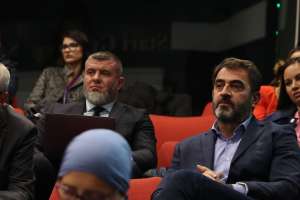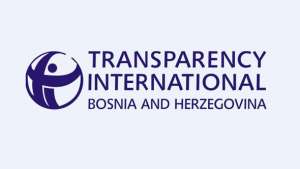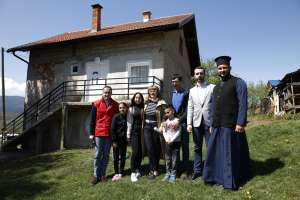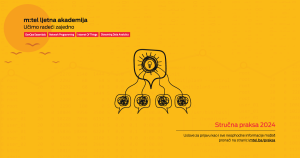SARAJEVO, October 17 (FENA) - Tourism is an important service sector for Bosnia and Herzegovina (BiH) - and could be even more important. Tourism accounted for 5.5 percent of total gross domestic product (GDP) in 2018, an increase of 4.1 percent in 2014, according to a report by the International Finance Corporation, a member of the World Bank Group, entitled "Bosnia and Herzegovina - Tourism Sector Diagnostic: Challenges and Opportunities for Sector Excellence".
Tourism is an important sector for the economy of Bosnia and Herzegovina (BiH) and provides jobs and opportunities for small and medium enterprises (SMEs) but is currently not at its full potential.
The number of arrivals to BiH is low compared to other countries in the region and many resources are still untapped or not fully market-ready. The Coronavirus disease 2019 (COVID-19) pandemic has severely hit the tourism sector and has reshaped, and will reshape, the tourism sector globally.
This not only allows for but also mandates significant change to the sector, and tourism should emerge as a more sustainable, economically productive, and broad-based activity that benefits people throughout the country. The purpose of this review of the tourism sector is to provide an overview of the sector pre-COVID-19 as well as recommend ways to move forward. It explores the supply and demand, assesses the public and private sector environment, and identifies opportunities as well as critical issues.
The review provides guidance on short-term strategies that can support private sector stakeholders with their most pressing needs during and after their recovery of the COVID-19 pandemic.
It also provides recommendations to build a more competitive and resilient sector in the medium term. The review analyzed the available data on the tourism sector and is based on extensive consultation with private and public sector stakeholders.
In 2019, tourism accounted for 50.3 percent of total services, and passenger services exports contributed 2.055 billion KM (about $ 1.3 billion) in the same year. Between 2014 and 2019, revenues generated by foreign travelers, which are considered the activity of exporting services, increased by 54.8 percent.
As highlighted in the publication, BiH still has limited results in terms of foreign direct investment (FDI) in tourism. Despite the potential of the sector, the share of tourism in total DSU is low as 1.02 percent.
In addition, since 2015, DSU levels in tourism have been declining. COVID-19 has hit the global tourism sector hard. In particular, the impact of the pandemic is clear from BiH's balance of payments. Exports of passenger services fell by 65 percent during the first six months of 2020 compared to the same period in 2019. The impact is even more obvious when comparing the second quarter of 2020 with the second quarter of 2019 when exports of passenger services fell from 590 million KM to 87.2 million KM (about 53 million dollars), which was a drop of 85.2 percent.
In the last 25 years before COVID-19, BiH has seen a rapid increase in tourist arrivals. The annual number of visitors increased from 115,000 in 1997 to more than 1.2 million in 2019, which was more than a tenfold increase.
However, as the report warns, even with this growth, the sector faces a number of specific constraints.
Among others, businesses face a number of bottlenecks in terms of issuing permits and regulations that make the establishment and operation of a tourism business entity unattractive. It also warns of the lack of an institution at the state level that uniquely regulates tourism, coordinates entities and stakeholders in the tourism industry and leads the state strategy for tourism development, and the lack of integrated destination planning.
It was also emphasized that the poor quality of data on supply and demand in the sector prevents the development of informed policies and effective decision-making that can improve the sector to be useful to the entire population.
Although BiH has a favorable geographical position, it does not have the adequate or quality infrastructure, which limits movement within the country to only a few iconic places such as Mostar and Međugorje, the report said, adding that representatives of the RS Ministry of Trade and Tourism emphasize the lack of highly qualified or certified personnel in the tourism industry, which prevents the development and provision of services.
The report's summary suggests that in BiH, for the country to unleash its full potential for sustainable and resilient tourism growth, there must be incentives, including a stable political and economic environment, a streamlined business environment and the availability of a workforce with the necessary education and skills. .
These recommendations are based on short- and medium-term approaches that combine interventions not only to improve the overall business environment and promotional framework but also to ensure an adequate response to the challenges posed by the COVID-19 pandemic.
In order to implement the short-term strategy (COVID-19 recovery strategy), all levels of government in BiH have already launched a set of measures directly related to the impact of the COVID-19 crisis, such as assistance through reducing fiscal and parafiscal levies, subsidies to guarantee minimum salaries to employees during the pandemic, a moratorium on all payments until the end of 2021 - in order to continue the set of fiscal measures with which the crisis was overcome at its beginning, including deferral of repayment and restructuring of commercial loans.
According to the report, in 2020, entity government programs have been launched to continue implementing policies to support companies with short-term liquidity problems, while adequate state financial assistance should ensure full implementation of established credit guarantee programs.
It was also pointed out that in order to develop a sustainable and productive sector, there is a need to improve several components that are crucial for the tourism sector. These medium-term strategies are based on the performance of the tourism sector in BiH, comparisons with comparable and aspirational countries, as well as an assessment of existing constraints in aligning with the 2020 UNWTO Framework for Inclusive Community Development through Tourism. The aim of this framework is to encourage a holistic and integrated approach to the inclusive development of communities through tourism.
In this context, BiH needs to develop - for all levels - a strategy that serves as a practical guideline with a strong market-oriented approach that lists target markets, as well as defined products to be developed and how to place them on the market.
The report concludes that there is a large and growing shortage of skilled workers in tourism throughout BiH, which produces urgency to identify the necessary steps to reduce the gap between the skill sets of the existing workforce and the skill sets needed to deliver competitive services and quality.
The report’s authors point out that globally, the sector is undergoing a major change as pandemics and disruptive technologies and other changes allow for expanded access to data, diverse products, and new demand trends. In this context, they add that this is not the time for BiH to be satisfied with a simple return to the state before COVID and to continue operating as usual.
These times require a commitment to support the sector in achieving key objectives - such as improved benefit-sharing, environmental protection, resilience and sustainability - which is achieved through a renewed strategic focus and targeted action. That commitment - and action accordingly - must come from all stakeholders.
Innovation and change take time - however, BiH has enormous resources and can smartly build the capacity it needs. The key to success is a continuous and coordinated strategic action to encourage investment and improve the competitiveness of the tourism offer, it is concluded in the report of the International Finance Corporation, a member of the World Bank Group.
(FENA) S. R.












